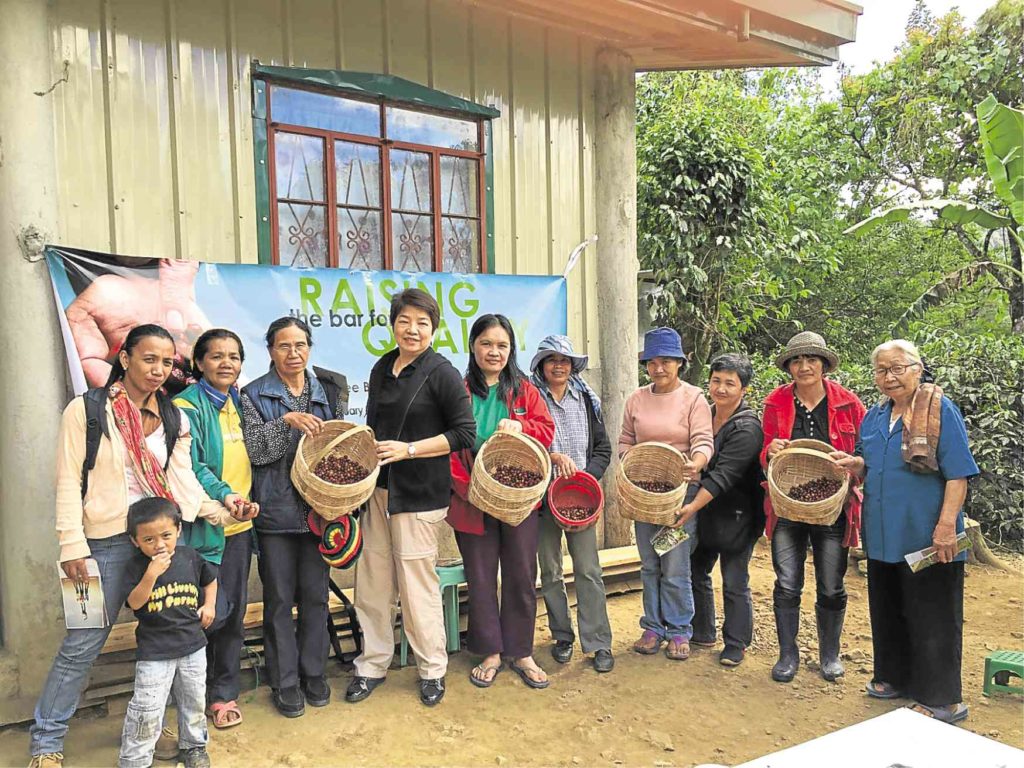
PCBI, PEF go to coffee communities to teach farmers how to pick out quality coffee.
From P100 to P400.
This is how much coffee farmers stand to gain should they upgrade the quality of their produce to that of “specialty” coffee—and it starts by getting the right grade, says the Philippine Coffee Board Inc. (PCBI).
“There is a big market for specialty coffee in Korea and Japan,” says Robert Francisco, PCBI director and certified Q grader, or an expert in scoring coffee based on a standard assessment developed by the US-based Coffee Quality Institute (CQI). “There is hope for Arabica farmers who have low production value but have exceptional coffee. Another big hope is for specialty Robusta.”
A score of 80 or higher on the CQI scale is what farmers need to achieve for their coffee to be called specialty, and the PCBI hopes to educate them—as well as other coffee entrepreneurs—on this at the upcoming 10th National Coffee Summit, which will be held on Oct. 24 at the SMX Convention Center, SM Lanang, Davao City (registration is ongoing at www.philcoffeeboard.com or through 0908-8831218).
The summit is part of PCBI’s continuing quest to to elevate the quality of Philippine coffee, as well as increase production rate to meet a rapidly growing local demand.
Aside from Francisco, speakers include Dr. Dave D’Haeze, Robusta coffee expert of the Hans Neumann Stiftung Foundation (HNSF), who will discuss issues on production and how the Philippines can increase its yield.
According to the PCBI, the Philippines’ coffee production has risen to 35,000 metric tons a year from its lowest in 2002 at 22,000 metric tons. However, supply still cannot keep up with local demand, which is at 120,000 metric tons.
D’Haeze, who has been working in Vietnam and Indonesia—the world’s No. 2 and No. 4, respectively, when it comes to coffee production volume—will speak about how Filipino farmers can take advantage of good soil and terrain to also increase local production.
Organizations such as the nonstock, nonprofit Peace and Equity Foundation (PEF), say there is strong potential for our country’s coffee production. “There’s history behind [our low production]. When coffee prices fell in the world market some time in the ’60s or ’70s, farmers had to replace their coffee plants with other crops,” says Ricardo Soto, PEF senior portfolio officer. “Now, however, with the resurgence of the demand for coffee, the farmers themselves are excited to replant.”
The PEF invests in social enterprises which provide families with viable livelihood and better access to basic services, focusing on agricultural businesses that grow what they call the four Cs: cacao, coconut, cane sugar, and coffee.
Also speaking at the summit is Agriculture Undersecretary Evelyn Laviña, who will present an update on the Philippine Coffee Roadmap; and Tourism Undersecretary Alma Rita Jimenez, who will tackle tourism business opportunities through coffee.
Special focus will be given to women working in coffee through the Great Women Project of the Philippine Commission on Women, which will be discussed by Boots Garcia, board adviser of the Women’s Business Council of the Philippines and co-chair of the Asean Women Entrepreneurs’ Network.
Summit delegates can also look forward to the announcement of the mechanics of the second Kape Pilipino (KP) cupping competition, which is slated for March 2018, right after harvest season. CQI’s Samuel Gurel, who was last year’s contest’s head judge, will share winning tips for those who plan to join next year.
The previous competition’s winners, women-led Inhandig Tribal Multi Purpose cooperative (ITMPC) from Malaybalay and Kape Maramag from Maramag in Bukidnon, will also speak about their experience. Both winners represented the Philippines in the Specialty Coffee Association’s annual event in Seattle last April.

